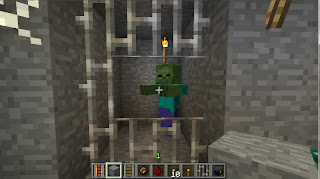Self-directed Learning / Personal Blog Posts
Personally, I loved the self directed learning aspect of this class. I loved being able to chose what I studied and follow my interests in whatever direction I chose. I often spent more time on these small "assignments" than I normally would simply because I enjoyed the topic I was learning about. I chose to focus mostly on Video Games and the issues surrounding openness. I also did some work on remix for the group project. Generally my method of research was just finding articles, starting with a Google Search and branching out from there to see what the internet thought about my chosen topics.
Blog Posts:
Reading:
All Your Base are Belong to Us
(Related to Openness) Net Neutrality
Google + Posts
The above is by no means all the work I did, but it's a good sampling.
Collaboration
One of the most important things that I did for my group was give it a kick in the pants. When we had failed to agree on what to do by midterm, I started working. I figured that my group would either love what I was doing an jump on board or hate it and come up with something else. The second happened, which I was totally fine with. Here is what I came up with in the meantime:
I also helped with prototyping, story boarding, coming up with the story line for our flash video. I also drew several pieces of concept art for Curtis' roommate to work from. I helped to present to the copyright office and I also contributed several sections to the blog.
I'll be honest, I wasn't all that helpful to the other groups. I offered my assistance to the Little Big Planet Group, but I never heard back from them and so I never moved forward with that. I also talked with Katie on several occasions to express my interest in her group's project, hoping to validate further what she was doing. I put out a call to my writer friends when the Novel group needed writers (though none responded) and a call to my artist friends when one of the groups was looking for some crowd sourced art for something (I don't remember what-the Novel group again maybe). But that's about it.
To the class in general-I think that I made good, relevant comments and asked useful questions.I also put together a post on Machinima and briefly described the topic for the class. Also, I was the class' Minecraft expert and a semi-expert on video games!
Other's Assistance
Tara really generated some interest for me, mainly with the topics that she brought up on Google +. The Badges group has inspired me to continue my learning through the internet, perhaps even with badges. I was also really excited by what the Little Big Planet Group was doing.
Digital Literacy
Consume-I've become a much smarter consumer. I've learned that there are other sources out there than just CNN and Wikipedia. I've learned how to search blogs and use Twitter as a search engine. I even tried an RSS feed, but it wasn't pretty enough for me =) Basically I learned how to learn better and more effectively.
Create-I've become much more aware of my ability to contribute useful things to the internet world. Particularly with blogging. Before this class I saw blogging as so much shouting into the void. In some ways, it is. But it has also allowed me to have a voice in a way that I haven't before. I can express my ideas clearly and concisely (or not) without being interrupted or (initially) argued with, but I can still be informal. I intend to continue blogging after this class, though I will avoid the dreaded Mommy Blog.
Connect-This is the category that I still struggle with. I just plain have a hard time putting myself out there. I'm afraid of being shot down or laughed at. I'm still working up the courage to Tweet someone about something consequential. What if they answer and I have to engage in a conversation that I am not prepared for? But I'm moving forward. I'm maintaining my Twitter account and remaining linked to the issues that I see as important so that, when I get brave, I can join the conversation in a meaningful way.
All boiled down? Great class and I learned a lot!









































